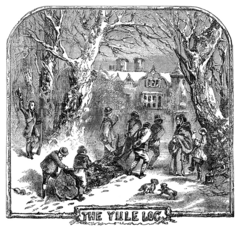
Back Joelfees Afrikaans Gēol ANG Ёль Byelorussian Ёль BE-X-OLD Yule Breton Festes de Jul Catalan Jule Czech Julfest German Julo Esperanto Yule Spanish
| Yule | |
|---|---|
 Hauling a Yule log in 1832 | |
| Also called | Yuletide, Yulefest |
| Observed by | Various Northern Europeans, Germanic peoples, Heathens, Wiccans, atheistic Satanists |
| Type | Cultural, Germanic pagan, modern pagan |
| Significance | Winter festival |
| Date | See § Date of observance |
| Frequency | Annual |
| Related to | Midwinter, Christmastide, Christmas |
Yule (also called Jul, jól or joulu) is a winter festival historically observed by the Germanic peoples that was incorporated into Christmas during the Christianisation of the Germanic peoples. In present times adherents of some new religious movements (such as Modern Germanic paganism) celebrate Yule independently of the Christian festival. Scholars have connected the original celebrations of Yule to the Wild Hunt, the god Odin, and the heathen Anglo-Saxon Mōdraniht ("Mothers' Night"). The term Yule and cognates are still used in English and the Scandinavian languages as well as in Finnish and Estonian to describe Christmas and other festivals occurring during the winter holiday season. Furthermore, some present-day Christmas customs and traditions such as the Yule log, Yule goat, Yule boar, Yule singing, and others may have connections to older pagan Yule traditions.